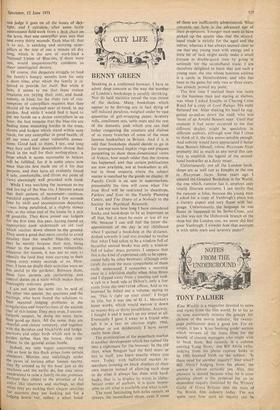CITY LIFE
li
BENNY GREEN
Speaking as a confirmed browser, 1 have to admit deep concern at the way the number of London's bookshops is steadily shrinking. Nor do bald statistics reveal the true extent of the decline. Many bookshops which appear to be thriving are in fact dying of self-induced paralysis, weighed under by vast quantities of gift-wrapping paper, lavatory rolls, condiment sets, table mats and the rest of the domestic junk which you can find today congesting the counters and shelves of so many branches of some of the most famous booksellers in Britain. And if it is odd that bookshops should decide to go in for monogrammed napkin rings and plaques purporting to show three-dimensional views of Venice, how much odder that the reverse has happened, and that certain publications are now available, not at booksellers at all, but in those emporia where the subject matter is matched by the goods on display. If Family Circle is on sale in supermarkets, presumably the time will come when The Iron Heel will he restricted to shoeshops, Fathers and Sons to the Family Planning Centre, and The Diary of a Nobody to the Society for Psychical Research.
I am not sure how long I have considered books and bookshops to be as important as all that, but it must be more or less all my life, because I can still feel the bitter dis- appointment of the day in my childhood when I spotted a bookshop in the distance, dashed towards it and was crushed to realise that what I had taken to be a window full of beautiful unread books was only a window full of ladies' dress patterns. I suppose that this is the kind of experience only to be appre- ciated fully by other browsers, although only rarely do even the most sympathetic of them really understand. I remember a morning once in a television studio when Alan Brien and I slipped away from a meeting and took a cab to a book sale at Dillon's, only a few yards from the SPECTATOR offices. And as we browsed he fished out a volume, saying to me, 'This is right up your street'. I forget its title, but it was one of H. L. Mencken's lesser works, which would narrow it down to twenty-five or thirty possibilities. Anyway, I bought it and it wasn't up my street at all. Eventually I gave it away to a friend who left it in a taxi on election night, 1966, whether or not deliberately I have never really been clear. The proliferation of the paperback market is another development which has turned life into a nightmare for the browser. in the old days, when Penguin had the field more or less to itself, you knew. exactly where you were. Today, with halfwitted market re- searchers insisting on block displays of their own imprint instead of allowing each shop to do what it always has done with hard- backs, that is, to display its wares in alpha- betical order of authors, it is quite impos- sible to tell what is available and what is not.
The most fascinating bolt-holes remain, as always, the secondhand shops, even if some of them are inefficiently administered. What concerns me here is the advanced age of their proprietors. Younger men seem to have picked up the quaint idea that the second- hand trade is strictly for the aged and the infirm, whereas it has always seemed clear to me that any young man with energy and a little bit of luck might easily make a small fortune in double-quick time by going in seriously for the secondhand trade. I am therefore delighted to learn that just such a young man, the one whose business address is a castle in Herefordshire, and who has been in the game for only two or three years, has already proved my point.
The first time 1 realised there was more to the business than just staring at shelves, was when 1 asked Josephs in Charing Cross Road for a copy of Lord Raingo. His reply flattened me. After shaking his head he sug- gested so-and-so down the road, who was 'more of an Arnold Bennett man'. Until that moment it had never occurred to me that different dealers might be specialists in different authors, although now that 1 come to think of it, the idea seems sensible enough. And nobody would,have appreciated it better than Bennett hfruself, whose Riceyinan Steps probably did as much as any novel this cen- tury to establish the legend of the second- hand bookseller as a dusty miser.
Unfortunately, not all the London book- shops are as well run as Josephs or the one in Riceyman Steps. Some years ago I entered the Greatest Bookshop in the World, the one which, rumour has it, employs only totally illiterate assistants. I can testify that the rumour is false, because the young man I asked for a copy of Vanbrugh's plays was a literary expert and very fluent with lan- guage. Unfortunately the language he was fluent in happened to be Serbo-Croat, and as this was not the Dubrovnik branch of the shop but the London one, we never did find poor Vanbrugh. 1 wonder how that assistant is with table mats and lavatory paper?


































 Previous page
Previous page